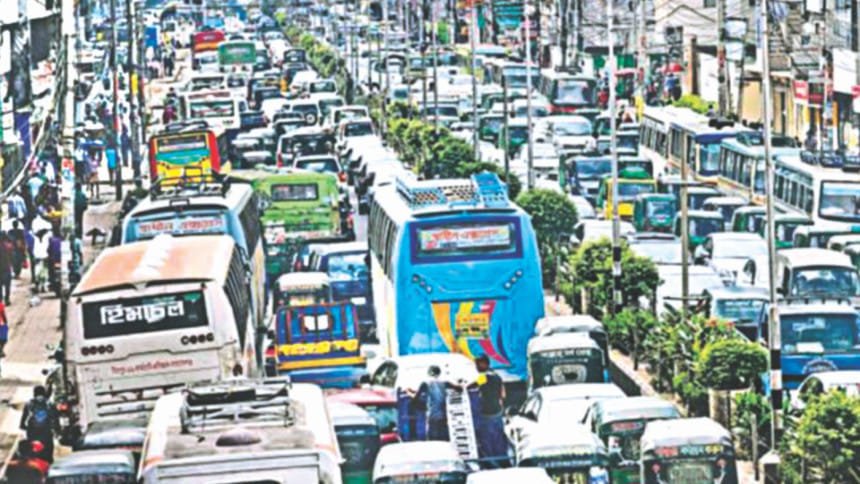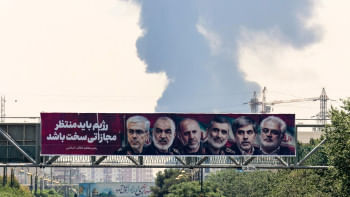Can we do something about Dhaka's unbearable noise pollution?

The alarmingly high level of noise pollution in Dhaka city calls for urgent attention of the authorities as well as the people at large. With the increasing number of vehicles including motorcycles on the capital's roads in recent years, the honking of cars has reached an unbearable limit and is a source of major discomfort for city dwellers. The question is whether the drivers of these vehicles understand the impact of mostly unnecessary honking on the general environment and on the people around them. Due to so much traffic congestion in almost all parts of the city, impatient drivers are seen honking incessantly which, almost always, does not have much of an effect.
Although there are several sources of noise pollution such as loudspeakers, building construction, street markets, mechanical workshops and small factories, vehicles are a major factor as they account for about three-quarters of all noise in the city. In addition to car horns, worn-out vehicles and poorly maintained car engines cause a lot of noise as well.
In technical terms, noise above 50 decibels can adversely affect public health, especially those individuals who suffer from hypertension and heart disease. The World Health Organization (WHO) cautions that any sound above 60 decibels can temporarily make a person deaf and prolonged exposure to sound above 100 decibels can cause hearing impairments. Several empirical studies have found sound levels ranging between 70 and 120 decibels in selected Dhaka city road intersections. According to the Noise Pollution (Control) Rules 2006, the acceptable sound limit is 50 decibels during the daytime and 45 decibels in the nighttime in residential areas of the city.
It is not only in the main thoroughfares where noise pollution is a problem; careless drivers continue to use their car horns in an insensitive manner—without thinking about the effects on people of old age, babies, students and the sick—near hospitals, clinics and schools. Car honking starts very early in the morning and continues unabated until midnight in many parts of the capital.
Many commercial and business activities like car workshops, welding shops, flour mills, etc., are allowed to operate and in fact are expanding in every residential area of the city. Vehicles going to and coming out of schools, hospitals and shopping malls situated inside residential areas cause traffic congestion as well as serious noise pollution for the residents in these areas. Again, the drivers of four-wheel vehicles and motorcycles have little consideration for the fact that they are inside residential areas and thus should not use vehicle horns frequently. But it seems that both drivers and passengers are indifferent to this fact. It is apparent that the general public is unaware of the impact of noise pollution on their health and do not see how it can affect blood pressure, cause headaches, nausea, and insomnia.
In busy residential areas, loudspeakers are used to advertise goods and services; microphones are used to celebrate weddings and cultural functions; musical stores advertise their collections by playing popular songs nonstop; and construction workers break bricks and stones on their sites, without any consideration for the effects on passersby and inhabitants.
From discussions with several conscious vehicle owners, this writer gathered that they constantly asked their drivers to stop honking on the street and it took them several weeks to fully convince the drivers not to use their horns so frequently. It shows how difficult it is to change drivers' attitudes towards honking.
City dwellers quietly accept the high noise levels which is quite unfortunate. A substantial reduction in noise levels is definitely possible. We should consider noise pollution as a serious concern and take action to keep it within limits to reduce the adverse effects of it.
At one point in the past, horn-free zones were created and signboards were put up in several areas of the city. However, due to the absence of proper monitoring and awareness-building, those attempts were not successful. In addition to banning horns in some selected areas, blaring of horns should be stopped near all hospitals, educational institutions, inside residential areas and office blocks. In Kolkata, to give an example of a similar situation, any area within a 100-metre radius of a hospital, nursing home, educational institution, library or the court is officially designated as a "silence zone". Kolkata has also imposed a fine for unnecessary honking.
Besides controlling the honking of vehicles, the fitness of all vehicles including buses, minibuses, trucks and three-wheelers should be checked on a regular basis. Other noise-polluting sources need to be identified and appropriate instructions should be provided to them to control their noise levels. The use of mics should be limited to certain purposes only and there need to be restrictions on the use of loudspeakers for social events such as weddings and birthdays inside residential areas after a certain time of the day.
The Noise Pollution (Control) Rules 2006 should be implemented strictly with the help of the traffic police, Ministry of Environment, Forest and Climate Change, Ministry of Home Affairs and Dhaka City Corporations which need to join hands and enforce the law and make Dhaka a bit more liveable. A general awareness campaign should be rolled out, particularly targeting drivers and vehicle owners, on the health consequences of noise pollution. While the government has the responsibility to control noise pollution, we as citizens need to also consciously use our judgment before using vehicle horns as well as educate our drivers.
Dr Nawshad Ahmed is an economist and urban planner. He previously worked as a UN official in Bangladesh and abroad.





Comments